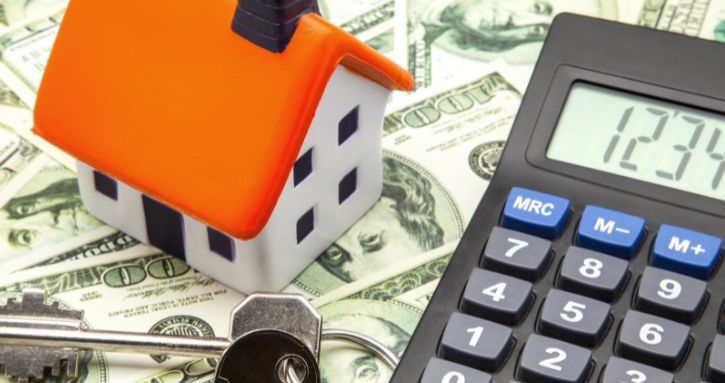Advice for Your First Home Purchase: 9 Practical Tips for Homebuyers
When you start considering the idea of purchasing a home, it might be tempting to open those apps that show lots of houses and get lost in countless pictures, envisioning which one could become your dream home.
However, before diving into the adventure of being a first-time homebuyer, focusing on some practical preparations is crucial. Doing your research beforehand will equip you with essential knowledge for the tips for the homebuyers’ journey, particularly when the housing market is active and there’s strong competition.

1. Evaluate Your Financial Obligations
Before applying for a mortgage and searching for your future home, evaluating your current financial standing is essential, especially in terms of existing debts. Lenders want assurance that you can effectively manage your current debts alongside the new mortgage you’re seeking. A key indicator in this process is your debt-to-income (DTI) ratio, which should ideally not surpass 36% of your gross monthly income, according to the Consumer Financial Protection Bureau (CFPB). Lenders generally consider a maximum DTI ratio of 43% as necessary for obtaining a qualified mortgage, ensuring a safer lending scenario.
To enhance your eligibility for a mortgage, it’s necessary to take control of your existing debts. This involves strategic actions, such as paying down credit card balances to stay within the recommended usage of no more than 30% of your available credit. Managing installment loans, like auto loans, by paying them off or significantly reducing the balance can ease your monthly financial commitments. Additionally, for those with student loan debt, carefully assess how these payments align with your ability to meet mortgage obligations. Prioritizing the repayment of credit card debt can potentially create more flexibility in your budget, allowing you to navigate both student loans and a mortgage more comfortably. By addressing these financial aspects early on, you can alleviate stress when it comes to fulfilling your monthly payment responsibilities.
2. Check Your Credit Health
When gearing up to purchase a home, ensure your credit is in good shape. The interest rate on your mortgage is closely tied to your credit score, making it prudent to check your credit well before embarking on your homebuying journey. This proactive step allows you ample time to rectify any errors on your credit report and potentially boost your credit score. Strategies for improving your credit include reducing credit card balances to positively influence your credit utilization rate. You might also explore increasing your credit card limits, but exercise caution to inquire about potential hard inquiries before doing so. Addressing any discrepancies in your credit report through the relevant dispute process can usually resolve valid errors within a month. While some mortgages accept credit scores as low as 500, most lenders prefer scores of at least 620 to 680 for consideration. A higher credit score improves your chances of approval and may lead to lower down payment requirements and more favorable interest rates.
With lower credit scores, lenders may demand a larger down payment and impose higher interest rates on your loan. Conversely, borrowers boasting high credit scores, typically 800 or more, enjoy lower down payment requirements and benefit from more favorable interest rates. The impact of your credit score on your mortgage terms underscores the importance of managing and, if possible, enhancing your credit standing as part of your homebuying preparation.
3. Determine Your Budget
When you transition into homeownership, your budget dynamics will shift, introducing new expenses beyond the mortgage payment. Anticipating additional costs such as property taxes, homeowners insurance, and maintenance is essential for effective financial planning. It’s wise to consider potential increases in utility bills and ensure you have sufficient savings to address unexpected repairs or emergencies. Many lenders, depending on the mortgage type, may require you to demonstrate two months’ worth of reserves in your bank account, covering the mortgage, taxes, and insurance. For instance, if your total payments amount to $1,000, having $2,000 in easily accessible savings is typically expected. For those considering condominiums or townhomes, homeowners association (HOA) fees may also factor into the lender’s budget assessment, adding another layer to your financial considerations.

The specific reserve requirements can vary among lenders and depend on the size of the loan. Even if your chosen mortgage doesn’t mandate reserves, maintaining a cushion of a few months’ worth of living expenses in your bank account is prudent. This financial buffer ensures you are well-prepared for any unforeseen circumstances and enhances your overall financial stability during the home buying process.
4. Real Estate Investment
Entering the world of real estate investment can be a promising opportunity for financial gain, provided you approach it wisely. Before diving in, explore various strategies like renting out properties or engaging in house flipping. Thoroughly research potential locations, and develop a clear plan for selling when the time is right. Additionally, carefully calculate expected expenses, including taxes, maintenance fees, and insurance premiums, to steer clear of costly missteps as you embark on your real estate investment journey. This upfront understanding and preparation will set you on a more secure path towards successful real estate ventures.
5. Downpayment
Determining the amount you’ll contribute as a down payment for your home hinges on the type of mortgage you secure, with the usual range falling between 3.5% and 20%. The general principle is that a higher down payment lowers the perceived risk for lenders. They believe that buyers investing more upfront are less likely to default on their loan. Conversely, when your down payment is less than 20%, lenders often safeguard against potential risks by imposing private mortgage insurance (PMI), an insurance policy protecting them in case of loan default.
To make an informed decision on your down payment, consulting with a mortgage officer is beneficial. Their expertise can guide you in understanding which loans require PMI and the optimal down payment amount to avoid this additional insurance. Saving for a more substantial down payment could qualify you for a mortgage without PMI, potentially saving you significant monthly costs.
6. Preapproval
Getting ready to buy a house is exciting, but before you step into open houses and start picturing furniture, getting preapproved for a mortgage is like buckling up before hitting the road. It might seem like an extra step, but it sets you up for a smoother, more confident journey towards your dream home.
Why? Here’s the deal. Preapproval tells you exactly how much house you can realistically afford, saving you the heartache of falling for places out of your budget. It’s like having a map that keeps you within the boundaries of your financial comfort zone. Plus, it transforms you from a casual browser into a serious buyer with a lender’s green light. This “serious buyer badge” tells real estate agents and sellers you’re ready to make things happen, giving your offers an edge and putting you in the driver’s seat for a successful home purchase.
7. Type of Home
Finding your dream home is a thrilling adventure, but before you start decorating daydreams, take a pit stop to map out your ideal dwelling. Knowing your budget is like having a treasure chest – now it’s time to decide what kind of house jewels you want to fill it with!

Single-family homes, the classic detached havens, offer ultimate space and independence, but come with a heftier price tag. Duplexes, sharing a wall or floor with another unit, are like friendly neighbors under one roof, offering a more budget-friendly option. If community is your jam, condos might be your match – you get your own cozy nest within a bigger building, sharing amenities like pools and gardens with neighbors, all for a monthly fee. And for those who like a touch of both worlds, townhomes offer stacked privacy with shared walls, giving you both the indoors and a little outdoor space, often at a price point lower than single-family homes, again with the bonus of association fees for shared upkeep.
Remember, the perfect home is a personal puzzle. Think about how much space you need, what your budget whispers, and any extra costs like association fees. You might find that your single-family dreams stretch your budget thin, while a condo or townhome could offer similar space at a lower price, making those fees a worthwhile investment
8. Research Where You Want to Live
Once you’re preapproved and have an idea of the type of home you’d prefer, it’s time to research your favorite neighborhoods.
Consider these neighborhood features when you’re shopping for a home:
- Schools: Top-rated schools typically have an impact on home prices.
- Walkability: Amenities within walking distance might be key to help you save a car trip, like playgrounds, grocery stores and public transit.
- Parking: If you’re considering a building without parking, pay attention to the availability of street parking, especially at night and on weekends when more residents might be parked. You can also explore rental parking options.
- Property taxes: Different neighborhoods can have vastly different property taxes. Your real estate professional will have this important information.
You might consider visiting your target neighborhoods several times and at various times of day to get a picture of what life might look like if you bought a home in the area.
9. Compare Mortgage Rates
As you get ready to commence your home search, it pays to shop around for mortgage loan rates.
According to a study by Freddie Mac, buyers who get mortgage quotes from one additional lender save an average of $1,000 over the life of their loan. Those who get up to five additional rate quotes save an average of $3,000.
As you compare lenders, be sure to look beyond the interest rate. You’ll want to compare closing costs, points and lenders fees, too.
Final Thoughts
As you consider the idea of purchasing a home, it might be tempting to open those apps that show lots of houses and get lost in countless pictures, envisioning which one could become your dream home. However, before diving into the adventure of being a first-time homebuyer, it’s crucial to focus on some practical preparations. Taking the time to do your research beforehand will equip you with essential knowledge for the homebuying journey, particularly when the housing market is active, and there’s strong competition. Explore valuable tips for homebuyers to ensure a smoother and more informed homebuying experience.
Resources:





